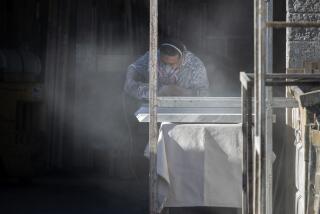Air board cracks down on diesel
- Share via
SACRAMENTO — California’s diesel-powered bulldozers, scrapers and other heavy construction equipment must be retrofitted or replaced over the next 13 years to reduce the air pollution that sickens tens of thousands of residents every year, state regulators decided Thursday.
Under tough new rules adopted by the Air Resources Board, California is the first state to make construction companies fix existing diesel-powered machines. Heavy equipment can last 30 years or more, so without the new mandate, it would take decades for fleets to upgrade to cleaner equipment.
Although the fumes are most often associated with big trucks and buses, 20% of California’s diesel pollution comes from the construction industry. Building, mining and airport vehicles are responsible for an estimated 1,100 premature deaths statewide every year and more than 1,000 hospitalizations for heart and lung disease, along with tens of thousands of asthma attacks, scientists say.
The air board’s new rules will slash diesel soot -- also known as particulate matter -- from construction equipment by 92% over 2000 levels. Smog-forming nitrogen oxides will be cut by more than a third. And greenhouse gases, a byproduct of fuel burning, also will drop as a result of a ban on idling equipment.
“This is a very progressive rule with a lot of flexibility,” said board Chairwoman Mary Nichols. “Beginning in 2010, we will be breathing far less of the smog and fine particulates that are so damaging to our health.”
The building industry hotly contested the rule, saying it would cause job losses, increase highway construction costs and damage the state’s economy. Michael Lewis, a lobbyist for the industry-led Coalition to Build a Cleaner California, said industry could not afford the retrofits. “And a regulation that is not achievable will not save one life,” he said.
The new regulation signaled a comeback for the powerful board, whose reputation was damaged in the wake of the recent firing of its former chairman, Robert Sawyer, by Gov. Arnold Schwarzenegger, and allegations that the governor’s staff had tried to weaken proposed pollution standards.
Nichols, an environmental lawyer appointed by Schwarzenegger to replace Sawyer, took an aggressive stance during Thursday’s daylong board meeting, opposing an industry proposal to delay enforcement.
The diesel rule, the result of three years of debate, drew applause from environmental groups.
“This was a great debut by Chairwoman Nichols,” said Kathryn Phillips, a lobbyist for Environmental Defense. “It shows that science and public health are still the main forces that drive the agency.”
The rule, which air board staff say will cost the industry up to $3.4 billion, is one of the most expensive adopted by the board. As part of an aggressive diesel cleanup, the board has also adopted restrictions on garbage trucks, buses and ships. Next on the agenda: heavy-duty trucks, which could cost even more to clean up than construction equipment.
The building industry operates 180,000 pieces of diesel machinery statewide. It costs up to $40,000 to buy particulate filters for a single million-dollar scraper.
Overall, contractors contended, the cost of the rules could reach $13 billion and boost the price of homes, highways and commercial buildings.
The discrepancy in the estimates of the cost to industry caused the board to delay action in May to allow staff to evaluate new economic data. In the last two months, air board economists and individual board members held dozens of meetings with industry groups and examined the financial records of companies.
Industry figures were based on an exaggerated rate of equipment turnover, among other factors, staffers told the board.
On a vote of 6 to 3, with Nichols leading the opposition, the board defeated an effort by industry groups to extend the compliance schedule. It maintained annual reduction targets for soot, rather than moving enforcement to a three-year schedule, which staff said could cut health benefits by as much as 12%.
In addition to an overall state standard, the board adopted a provision that will allow Los Angeles and nearby counties, the San Joaquin Valley and other particularly polluted regions to accelerate the diesel equipment cleanup schedule in their districts.
“It’s a good day for clean air,” said Barry Wallerstein, executive officer of the South Coast Air Quality Management District.
Wallerstein said the region must achieve twice the amount of construction pollution cuts as the overall state goal in order to meet federal standards. The region, one of the dirtiest in the country, is under a strict mandate to improve its air by 2015. The AQMD will offer construction companies $120 million in incentives to purchase particulate filters or buy new machines.
To soften the economic hardship on mom-and-pop businesses, the new rule gives small fleets until 2015 to begin compliance, while large fleets must begin in 2010.
More to Read
Sign up for Essential California
The most important California stories and recommendations in your inbox every morning.
You may occasionally receive promotional content from the Los Angeles Times.














